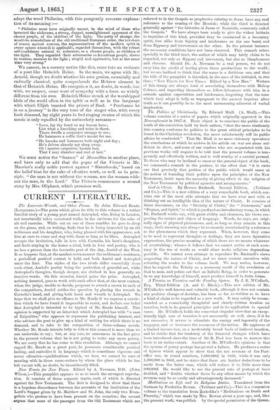CURRENT LITERATURE.
The Laureate-Wreath, and Other Poems. By John Edward Reade. (Longmans.)—The poem which gives its title to this volume is a rather fanciful story of a young poet named Astrophel, who, living in London, not unnaturally takes occasional walks in the environs for the sake of air and exercise. While out on one of these rambles he goes to sleep on the grass, and, on waking, finds that he is being inspected by an old nobleman and his daughter, who, being pleased with his appearance, ask him at once to come and stay with them as long as he likes. Astrophel accepts the invitation, falls in love with Cornelia, his host's daughter, and finds staying in the house a rival, both in love and poetry, who is no less a person than the favourite poet of the day, Auriol of the West. It so happens that, at the market-town nearest tho nobleman's residence, a periodical poetical contest is held, and both Auriol and Astrophel enter the lists. The styles of the two rivals differ essentially from each other, Auriol's poetry being the perfection of graceful art, while Astrophers thoughts, though deeper, are clothed in less generally at- tractive words. On this occasion Auriol gains the prize. Astrophel, nothing daunted, goes to work with such effect that, at the next contest, when the judge, unable to decide, proposes to award a crown to each of the competitors, Auriol settles the question by placing the wreath in Cornelia's hand, and giving both hand and wreath to Astrophel. We hope that we shall give no offence to Mr. Reade if we express a convic- tion which we have found it impossible to resist, and declare our belief that Astrophel is intended to be typical of Mr. Reads himself. This opinion is supported by an interview which Astrophel has with "a man of Exiguities," who appears to represent the publishing interest, and -who advisee the poet to give up a kind of writing for which there is no demand, and to take to the composition of three-volume novels. Whether Mr. Reade intends fully to follow this counsel is more than we can undertake to say ; but, at any rate, he announces in the last piece in the present volume that he is not going to write any more poetry. We are sorry that he has come to this resolution. Although we cannot regard Mr. Reade as a great poet, he possesses considerable poetical feeling, and embodies it in language which is sometimes vigorous and never offensive—qualifications which, we fear, we cannot be sure of meeting with in those verse-writers by whom the place which he has left vacant will, no doubt, be incontinently filled.






























 Previous page
Previous page